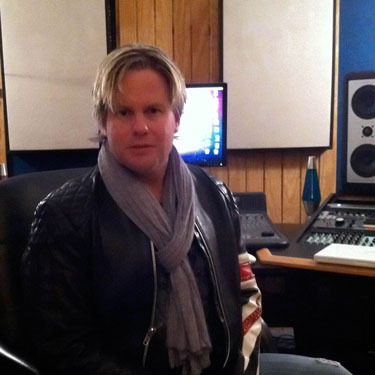|
 It's been almost thirty years since Twisted Sister released its iconic Stay Hungry, the cover of which featured frontman Dee Snider dressed and painted as a macabre rag doll, backed into the corner in a dilapidated tenement, threatening (perhaps?) to eat (we think?) a raw shank of meat. It's been almost thirty years since Twisted Sister released its iconic Stay Hungry, the cover of which featured frontman Dee Snider dressed and painted as a macabre rag doll, backed into the corner in a dilapidated tenement, threatening (perhaps?) to eat (we think?) a raw shank of meat.
(If the image isn't already burned into your brain, Google it... it will be.) In the early 1980s, that cover somehow made sense. Again, Snider plans to make a sensibly absurd statement that magically resonates with the zeitgeist of the times with Dee Does Broadway. Yes, outspoken metal-man Dee Snider has, in collaboration with numerous stars of the Great White Way, warped the world's most famous show tunes through the funhouse mirror of heavy metal. Session drummer extraordinaire Brett Chassen provides the backbone for the unique release and, because he boasts tremendous talent on the other side of the glass as well, is responsible for recording and mixing it. One of the most important constants in Chassen's arsenal is Metric Halo's ChannelStrip plug-in, which plays multiple critical roles on every track of Snider's forthcoming release.
"Metric Halo got it right," said Chassen, flatly. "There's a good reason why ChannelStrip has been around for a long time. It has a maturity to it that you don't find in most plug-ins. Most plug-ins have very little tolerance for messing around. If you start spinning virtual knobs and flipping virtual switches, they don't just sound wrong, they sound broken. They get all strident and glassy. That doesn't happen with high-end analog hardware. You can spin knobs and flip switches, and while it may not sound right, it certainly doesn't sound broken. ChannelStrip is like hardware in that way. It has character and strength that makes it sound and feel solid, no matter what you do with it."
That robustness has led Chassen to use ChannelStrip in ways that he had never considered using other plug-ins. For example, the guitars on Dee Does Broadway have a presence and immediacy that doesn't get in the way of the other instruments. "ChannelStrip is responsible for that," said Chassen. "With other plug-ins, I wouldn't dream of boosting something like 1.5 kHz. But with ChannelStrip, it's like turning up the gain on an analog equalizer. If the part suits it, the boost sounds right." Chassen boosts 1.5 kHz when he needs a guitar to poke through. He also boosts frequencies near 500 Hz for guitar leads. He said, "It gives them a nice fullness that cuts through the track without becoming boxy."
Drums benefit as well. "With ChannelStrip, I don't hesitate to boost high end on the drums, even up at 5 kHz or 10 kHz," he said. "The compressor on ChannelStrip is also really nice. I love the way it moves, frequency-wise. It tends to bend all the right frequencies, just like a nice analog compressor. I can really smack it with drums and it never breaks up. The image and body hold together. I would never consider hitting another plug-in that hard with drums because they invariably become splotchy and indistinct."
Of course Snider's vocals get the ChannelStrip treatment. "Dee has a lot of aggressive presence in his voice," said Chassen. "He's very much in attack mode. He's like a buzz saw. With other plug-ins, when I notch out a problematic frequency, I find that other stuff starts disappearing as well. It's like unintended consequences. But with ChannelStrip, I can pull out the [imitating the sound of hissing radiator again] at around 2.5 kHz without negatively affecting anything else. Most importantly, the excitement is still there."
Chassen concluded by saying that ChannelStrip, together with some nice reverb and effects, would suffice on a desert island. "It's just inspiring to use," he said. "You find yourself playing around to see what you can come up with. And it's not exactly transparent either, but in the good way. It's got its own thing. But at the same time, it doesn't leave an oversized paw print. In the world of plug-ins, ChannelStrip is definitely unique." As will be the forthcoming album, due out in the first quarter, 2012 on Razor & Tie Records.
|